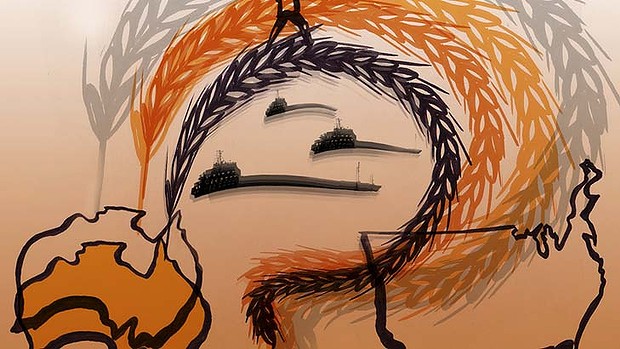Free-trade pact may muddy GrainCorp deal

Sydney Morning Herald | November 29, 2013
Free-trade pact may muddy GrainCorp deal
Malcolm Maiden
A side deal in the free-trade agreement with the United States that the Howard government negotiated in 2004 is a wildcard as the Abbott government deals with divisions in its ranks over Archer Daniels Midland’s $3.4 billion takeover offer for GrainCorp, the biggest grain handler in eastern Australia.
The free-trade agreement issue was believed to have surfaced last week, and it appears to increase pressure on the government to finally wave the takeover through.
It commits the government to advise the US government if there are concerns about a US takeover bid for an Australian company, to give the US the option of opening up direct government-to-government talks, and to allow ’’sufficient time’’ for it to do so.
In October Treasurer Joe Hockey extended the deadline for a decision on Archer Daniels’ bid for GrainCorp to December 17 - now three weeks away. Hockey hinted on Thursday, however, that the decision was closer, saying it was ’’not too far off’’.
In October he cited the size and complexity of the takeover when he gave himself more time, but by then it was also clear that the Coalition was divided about the takeover proposal, with Nationals leader Warren Truss and Nationals deputy leader Barnaby Joyce leading a push against it.
Archer Daniels’ concern that the bid would be blocked prompted it to offer new concessions on Wednesday, including an additional $200 million of capital expenditure for GrainCorp and three-year price caps on grain handling and storage charges.
The concessions did not kill off market speculation that the government would seek more - the disposal of some or all of GrainCorp’s eastern seaboards, for example - or even block the deal. If the government does want more, however, the free-trade agreement appears to be in play.
It not only sets up government-to-government negotiations on deals that are causing the Australian government concern, Canberra is also required to obtain the consent of the investor, in this case, Archer Daniels.
Government-to-government talks would be a market-sensitive event because they would suggest the Australian government did have concerns about Archer Daniels taking over GrainCorp.
The absence of stock exchange announcements from Archer Daniels and GrainCorp might therefore mean the market speculation is wrong, and that Mr Hockey has decided to not constrain or block the deal. It might, however, also mean that the free-trade agreement rider has not yet fully kicked in, having only been detected as an issue recently.
Australia’s ability to reject foreign investment proposals is treated as a ’’non-conforming measure’’ in the 2004 free-trade agreement with the US, but protocols that can deal the US government into talks about contentious deals are detailed in an exchange of letters on May 18, 2004, between the then trade minister, Mark Vaile, and Robert Zoellick, the then US Trade Representative who went on to become president of the World Bank between 2007 and 2012. The pair describe the letters as an integral part of the free-trade agreement.
Vaile’s letter states that the Australian government welcomes foreign investment. It says that if the government is concerned about a foreign investment proposal, it will hold talks with the investor aimed at resolving its concerns, including talks about conditions.
Vaile states that the government’s approach to foreign investment in future will conform with its approach in the past. He says the government also recognises the importance the US government attaches to ’’liberal access to the Australian market’’ given Australia’s power to block or modify takeover proposals.
His letter then states that if a proposed US investment raises ’’serious concerns’’ that could result in it being blocked, modified or unwound, the Australian government would, with the consent of the investor, ’’inform the government of the United States of the reasons … [and] provide the US government an opportunity to consult with the government of Australia on the matter’’.
It adds that the US government will be informed in a way that balances the need to decide the matter quickly with the objective of allowing the US government sufficient time to consult if it chooses to. The US would be likely to take up the option if Archer Daniels were in danger of being blocked.
Mr Hockey has a lot on his desk. He added Qantas’ push for less restrictive ownership rules on Wednesday, saying the airline’s problems required a response, and a public debate.
He doesn’t need the complication of the free-trade agreement rider, and the head-on confrontation with the US government it potentially sets up.
The Nationals are manning the barricades, but the way to sideline the free-trade agreement is to wave the Archer Daniels bid through, perhaps quickly. Stay tuned.
mmaiden@fairfaxmedia.com.au





